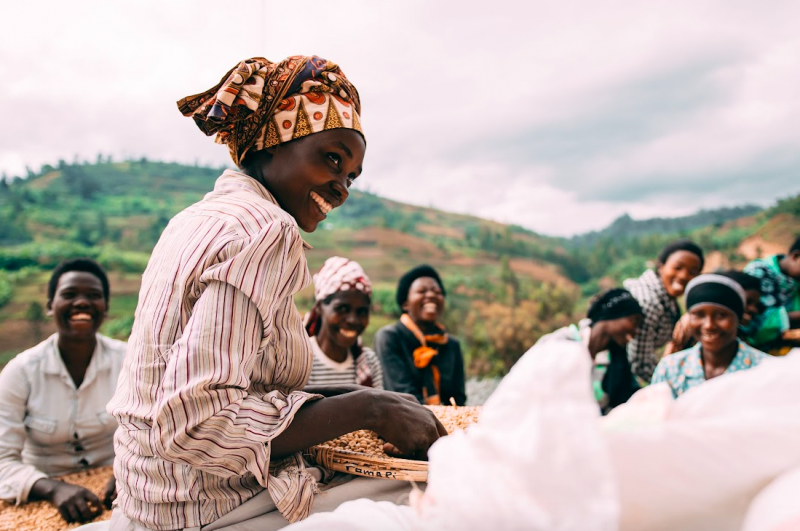Wow, well this has been a long time coming!
The Top 10 of 2022's A Shot in the Dark competition have been very patiently waiting. After some very unexpected delays in coffee delivery last year, we have secured some phenomenal and interesting coffees to challenge our Roasters.
So let's recap, here are your Top 10 Finalists:

The challenge now begins to get the best out of the coffees provided. We always ask our sponsors to select something interesting and exciting that really tests the skills of our competitors and with this Anoxic Natural from Rwanda, we have no doubt the roasters are going to have some fun!!!
They will be receiving the following coffees proudly sponsored by Raw Material in partnership with Muraho Trading and Seam Coffee.
.png)
More about Rugali Coffee Washing Station
In Rwanda, Raw Material works alongside Muraho Trading Co. This partnership helps affiliate co-operatives increase their quality of production, fetch a higher price for their coffee, and introduce them to new markets. This will be a continuous work in progress in the coming years, as we gain a greater understanding of the particular challenges Rwandan coffee producers face.
Through this process we can develop a model that creates incentives which generate producer buy-in, all the while maximising impact. We supply coffee from across Muraho’s washing stations, which are located in the Nyamasheke, Gakenke, and Nyabihu regions of Rwanda. Built in April 2016, Rugali coffee washing station sees an annual production of approximately 54,000kg of milled green coffee each year. The drying conditions at Rugali are ideal for ensuring optimal post-pulp drying, where coffee is laid on the drying beds between 12 pm and 3 pm, to ensure maximum exposure to the sun during the warmest time of the day.
 ©Raw Material
©Raw Material
Rugali has become an impactful example of a successful washing station for the specialty coffee market. It is a station that has in just a few years produced coffees that have been used in competitions worldwide and put the Nyamasheke District on the map for high-quality processed Rwandan coffees.
The station is located close to its smaller sister station Kilimbi. These two stations were the first stations in Rwanda to legally export natural and honey processed coffees. While production of natural and honey processed coffee is still monitored strictly by NAEB, the elevation of Rugali naturally lends itself to producing coffee in these styles.
For the Espresso Round they have received a Timor Leste:
Mota Bandeira
Mota Bandeira is the name of a popular waterfall in Timor-Leste near to the Raimutin Wet Mill, and one of the country's main tourist destinations. Forest-grown, the mota bandeira lots are fully shade grown in the wild forest lands of the Ermera Region. These trees have never been affected by fertilisers, chemical additions, and as such are organic by default.
The mota bandeira lot is an expression of the profiles from across the sucos that we represent, in naturally and washed processes. This means these are coffees that can be easily scaled to become large volume lots, much like the well loved Risaralda Regional Blend, Colombia. This lot is processed across two of the washing stations we constructed in the last three years; Malabe, and Raimutin. Once these stations reach maximum production capacity, thanks to the support of roasters like you, an additional 500,000 USD income will be generated for the producers who we represent.
Washed Process
Wet Mill: Raimutin Community Wet Mill
Region: Ermera
Country: Timor-Leste
Altitude: 1400 - 1600 MASL
Variety: Hybrido de Timor, Typica
Process: Washed
Preparation: EP 0,20
Packing: Ecotact 60kg
During the building of the Raimutin Community Wet Mill, it was important to consider the best practices that could be applied to the drying stages of coffee processing. Pulling on the collective knowledge from the managers of the producing countries of the Raw Material team, we were able to hybridise our drying beds.
Ripe cherry is first floated in water, to separate the fruit by density. The higher the density, the higher the quality of the coffee. This leaves the low density, less mature cherries to float to the surface, which are easily removed from the water. Though not used for export, these cherries are processed separately, and sold to the local market.
The station staff then meticulously hand-sort the freshly picked and well-sorted cherry, removing all damaged or underripe fruit by eye. This well-sorted harvest is now pulped, separating the cherry from the parchment coffee. The coffee then undergoes fermentation for a full 24 hours.
Once this stage is complete the parchment is washed again, removing any residual floaters and cherry skin in the process. These floaters are not discarded, but instead are sold with other low density coffee into the local market.
The parchment is then transported to raised beds, where the coffee is dried in high. The staff turn the lots regularly to ensure even airflow and sun contact, for a duration of between 15 - 20 days. When the coffee has reached a drying level of around 14%, the coffee is then transported to lower altitudes with higher temperatures, to complete the drying phase.
Once the drying is complete, the coffee is prepared for export at the Railaco dry mill.
